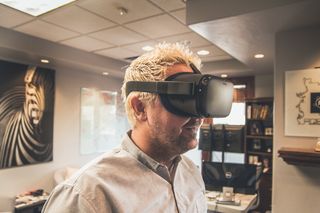
Mild Cognitive Impairment
5 Ways the New Oculus Quest/Valve Index Will Change Research
The new generation of VR hardware will grow VR research.
Posted July 29, 2019

With the exciting release of the Oculus Quest and Valve Index over the last couple months, we thought it would be an ideal time to cover five ways we think this new generation of VR hardware (all-in-one 6 DoF HMDs) will impact psychological research.
1. Better affordability and less risk.
With the price tag of only $399 (USD) for the 64 GB Oculus Quest, more researchers will be comfortable shelling out the money to start running VR experiments. And unlike before, researchers need not worry about whether their current computer equipment supports the processing power required for running tethered VR HMDs (if they go with the Quest or Valve Index options).
We’ve already covered how VR is growing in psychological research—and why it’s unlikely to stop—but we suspect with such a low price point and forgone reliance on expensive computer equipment, this growth of VR in research will continue to accelerate.
2. Easier to set up experiments in different spaces.
One of the most exciting developments in this generation of VR HMDs is their inside-out positional tracking systems that allow users to convert any space into a VR space without having external infrared sensors.
Labs short on space can comfortably move to larger shared workspaces with minimal effort, or they can make use of spaces in their labs which previously were tricky to set up with external sensors. Inside-out tracking also eliminates the costs associated with buying external sensors.
3. Easier to design multiplayer experiments.
VR already offers some advantages to studies in social psychology, from greater control over social stimuli to greater capabilities for tracking complex behaviors like body language. The new Oculus Quest will greatly enhance researchers’ ability to design and implement social experiments via multiple people experiencing the same situation.
The current generation does not allow communication between sets of HMDs (through Bluetooth or other technologies), but experimenters would still be able to have multiple players sending and communicating information through the Internet.
We expect to see a greater proliferation of multiplayer experiments in VR with the ease of the Oculus Quest’s all-in-one-systems, which avoid the problems of cords being obstructive or multiple users accidentally blocking external sensors from accurately keeping track of positional information.
4. Working with more challenging populations will become easier.
VR has already made headlines for its potential to help cognitive decline in the elderly, and we suspect that this generation of VR HMDs will make it easier to design, develop, and implement clinical tools and applications specifically for the elderly, among other unique populations.
Setting up external trackers in nursing homes is a pain, and cords are dangerous tripping hazards. Without these setbacks, previous devices like the Oculus Go were incapable of providing the richest VR experiences that require 6 DoF tracking.
It’s exciting to imagine the possibilities for virtual travel (amongst others) and how these devices would take a step towards truly enriching the lives of those in late adulthood. Similarly, there are many populations that for various reasons or limitations could benefit from less intrusive VR, whether it be in hospitals or at home.
5. Raise questions about the validity and reliability of head and positional tracking information.
The new inside-out-tracking offers a plethora of benefits for research, but its impact on VR research will also raise questions about its use. While there has been a steady trickle of research examining the validity and reliability of different VR systems and their positional tracking, it’s unclear from an experimental perspective whether this new technology offers the same scientific validity and reliability as previous systems.
Only time will tell, as researchers get their hands on these devices and test their full capabilities. We’re optimistic to be some of the first to start.

